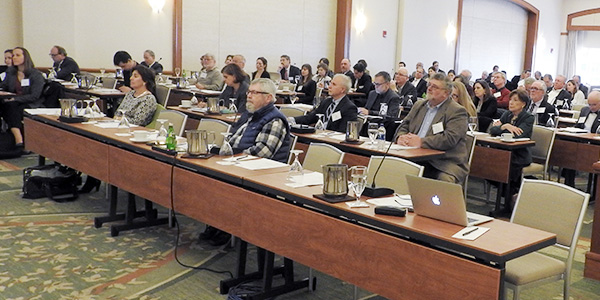By Michael Kuser
BOSTON — Fuel security topped the agenda at the quarterly meeting of ISO-NE’s Consumer Liaison Group on Thursday.
“While the calendar might not say winter yet, the cold season starts Dec. 1” for the RTO, said Anne George, ISO-NE vice president for external affairs. She highlighted three new ways the RTO is dealing with winter this year, including new measures on fuel security that were approved by FERC earlier in the week. (See ISO-NE Fuel Security Measures Approved.)
First, the Winter Reliability Program was discontinued as Pay-for-Performance incentives took effect June 1. Second, a new energy availability forecasting and reporting framework has been added to the operating procedures to improve situational awareness and encourage proactive measures to avoid energy shortages.
“The third one is a way for resources to price in their opportunity costs for having fuel,” George said. “It was not fully available to do that in the energy market last winter, and we hope that by doing this it gives resources the opportunity to value their fuel and … that the energy market will reflect that value.”
“The wholesale energy markets were not designed to deal with fuel security at all,” said Mark Karl, the RTO’s vice president for market development. “We need to look at where we’ve come from. … The world has changed and so the design objectives need to change.”
In a concurrence on the commission’s Dec. 3 fuel security order, Commissioner Richard Glick wrote that “ISO-NE’s apparent need to retain units for fuel security is the result of a market failure” and that the RTO’s “ultimate approach to fuel security will need to be more sophisticated than the interim approach we approve today.”
Karl said the long-term solution the RTO is considering has three components: multiple day-ahead markets, a new ancillary service that’s integrated into that, and a new, voluntary, forward seasonal auction.
The RTO plans to launch a quantitative and qualitative analysis on its proposal, including potential cost impacts, next year and file a proposal with FERC by July 1, 2019, he said.
The new ancillary service would seek “to maintain an inventory — what we call a buffer stock in economics — of fuel that can be converted into electricity.”
While current markets optimize over a single day, the new design will optimize fuel supplies and stored energy over five or six days, Karl said. The voluntary auction is intended to provide an incentive for resource owners to procure fuel inventory for the next winter.
FERC’s ruling, which approved an out-of-market agreement to keep Exelon’s 2,274-MW Mystic plant running after its capacity obligations expire in May 2022, endorsed the ISO-NE proposal and rejected all of the New England Power Pool’s suggestions, said Paul Peterson of Synapse Energy Economics, which serves numerous NEPOOL participants, mostly in the End User and Alternative Resources sectors.
The NEPOOL alternative proposals approved by stakeholders and filed with FERC would limit the retention of resources for fuel security to Forward Capacity Auction 14, covering 2024-2025, and add FCA 15 only if necessary. NEPOOL also recommended requiring generators to report fuel status for winter; raising the threshold for triggering a fuel security reliability contract; and allocating reliability costs to the transmission portion of bill to reduce risk premiums from suppliers.
“Time will tell,” Peterson said. “We’ll have an opportunity four or five years from now to see whether or not the levels of fuel security that the [RTO] used to justify retention of Mystic really were true.
“And that’s one of the concerns on the ongoing back-and-forth between NEPOOL stakeholders and ISO-NE: What level of risk? What level of reliability? What level of cost? How are those things balanced out in a way that makes the region reasonably secure in the delivery of electricity?” Peterson said.
“How do we get an adequate supply of natural gas? How long is it going to take to build the offshore wind projects?” asked Massachusetts Rep. Thomas Golden, House chair of the state legislature’s Joint Committee on Telecommunications, Utilities and Energy.
“There’s a misperception that New England is seeing a continually increasing demand for natural gas to generate electricity,” Peterson said.
“Since 2010, the share of power generated by natural gas has grown, but overall consumption of gas has declined and will continue to do so,” Peterson said. “By our projections, demand for natural gas in 2030 will have declined 41% from 2015 figures.” Peterson’s projection assumes the operation of a Massachusetts “clean hydro” transmission line by 2023 and the addition of 1,600 MW of offshore wind in 2027.
Millstone
Eric Annes, a technology analyst with Connecticut’s Department of Energy and Environmental Protection (DEEP), said that both DEEP and the state’s Public Utilities Regulatory Authority have found Dominion Energy’s Millstone nuclear plant to be at risk and that the 2,111-MW plant “is critical to our carbon goals and to winter fuel security.” (See Connecticut Likely to OK Millstone for Zero-carbon RFP.)
“No one has had experience with the winter we’re about to experience this year or will experience the next couple of years,” Peterson said. “Suppliers don’t know what kind of costs they’re going to be facing. When they go to customers to offer them a bid for energy supply for 18 months or two years in the future, they’re going to put a risk premium on that because of the costs they don’t know whether they can take care of or not — they don’t even know how big they’re going to be.”
The CLG on Thursday elected a new coordinating committee for the 2019-2020 term. The new members and their respective states are: Deena Frankel (Vt.); August Fromuth (N.H.); Douglas Gablinske (R.I.); D. Maurice Kreis (N.H.); Erika Niedowski (R.I.); Guy Page (Vt.); Robert Rio (Mass.); Joseph Rosenthal (Conn.); Mary Smith (Mass.); Rebecca Tepper (Mass.); Mary Usovicz (Mass.); and Liz Wyman (Maine).



